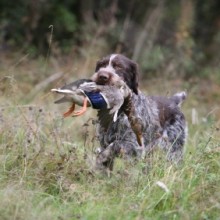German Wirehaired Pointer
Lifestyle Needs

The German Wirehaired Pointer is part of the group of Gundogs known as hunt, point, retrieve, he therefore has a strong hunting instinct. He is a large, strong athletic dog who needs more than two hours exercise every day and plenty of free running. Ideally he should live in a house with a garden. The GWP is noted for his harsh, wiry, protective coat which needs to be groomed a couple of times a week and occasionally ‘stripped’. He needs a firm, experienced owner who is willing to invest time in his training. There can be temperament issues, including aggression and separation anxiety. He does not make an ideal family dog.
Genetic Diversity
(Known as Coefficient of Inbreeding: 'COI'. It should be as low as possible.)
The UK Kennel Club breed average COI is 3.6% - See 'A Beginners Guide to COI'
Gene Pool Size
(Known as Effective Population Size: 'EPS')
416.94
EPS is a measure of how many individuals are contributing genetically to a breed population. It is a measure of the size of the gene pool in a breed. Lower than 100 is considered critical by conservationists and below 50 brings a breed close to extinction. For more information see the Kennel Club article.
Health and Welfare Problems due to Conformation
(Body shape and physical characteristics)
- Gastric dilatation volvulus (GDV) (Bloat/Torsion) Associated with deep chested breeds.
BVA/KC Health Schemes: www.bva.co.uk/chs
- Hip dysplasia: breed 5 year mean score 10.4 (parents should be lower)
- Elbow dysplasia – grade should be as low as possible
- Eye Scheme
Estimated Breeding Values (EBVs) : No EBVs are currently available for this breed
www.thekennelclub.org.uk/about-ebvs
DNA Tests Available
DogWellNet and IPFD Harmonisation of Genetic Testing for Dogs (HGTD)
www.dogwellnet.com/breeds
- von Willebrands disease (vWD) type 2
- Exercise Induced Collapse (EIC)
Availability of a DNA test does not mean that it is always necessary or even desirable for breeders to use this test.
Other Breed-Specific Health Screening Schemes
Breed club testing by echocardiogram for Dilated Cardiomyopathy (DCM).
Ask the breeder to show you the certificates for the above tests/screening for both parents. If any of the above tests have not been considered necessary by the breeder (and there may be good reasons), ask her to explain why.
Other Diseases Reported
(For which there are currently no genetic or screening tests for sire or dam)
- Idiopathic Epilepsy
- Dilated cardiomyopathy (DCM)
- Osteosarcoma
- Lipoma
Ask the breeder about the medical history of the parents, grandparents and great grandparents. Consider carefully whether to purchase a puppy if some of these or other diseases are in the family line.
Ask about the breeder’s policy in cases of serious genetic diseases occurring to your puppy in later life. Good breeders will request to be informed of such events in order to improve future breeding decisions.
You are strongly advised to buy from a breeder who uses (or is prepared to use) the AWF Puppy Contract and Puppy Information Pack (PIP): www.puppycontract.org.uk
The breeder should also be familiar with the CFSG/DBRG Code of Practice for Dog Breeding